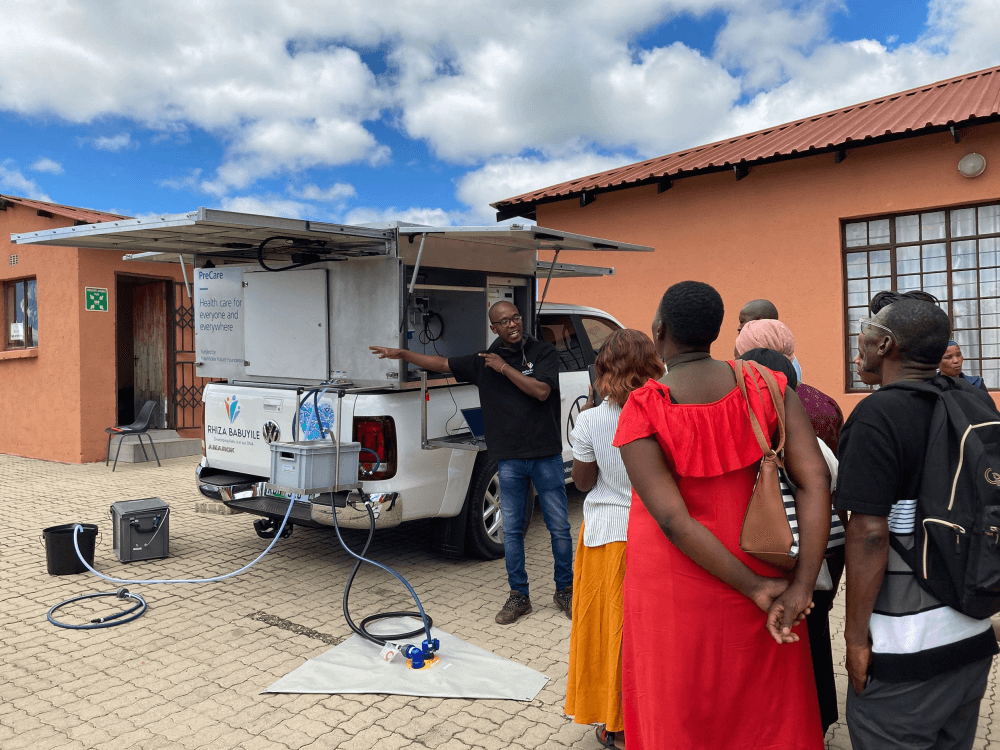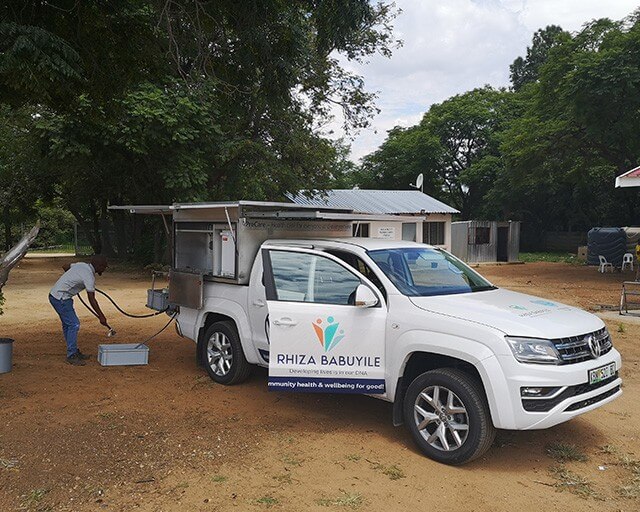| Duration: | 10/2022 - 03/2024 |
| Contracting Authority / Sponsors: |
Bundesministerium für Wirtschaft und Klimaschutz (BMWK) |
| Project Partners: | Fraunhofer IST, Stellenbosch University, Rhiza Babuyile |
| Project Focus: |
PreCare – »Health Care for Everyone and Everywhere«


In rural regions of the African continent, poor accessibility often poses a major obstacle to providing comprehensive medical care to the population. In the “PreCare – Health Care for Everyone and Everywhere” project, an international team from two Fraunhofer Institutes and Stellenbosch University is developing cost-effective modular solutions for pickup trucks that will enable pre-clinical examinations, tests, and vaccinations to be carried out even in remote areas. Creating prospects for local people is a task of global interest for both humanitarian and economic reasons.
The challenges are enormous: more than 1.5 million people die every year in the sub-Saharan region alone from the four most common diseases: malaria, HIV/AIDS, COVID-19, and tuberculosis. The reasons for this are often a lack of health care and hygiene standards, especially in remote areas. People living in regions with poor infrastructure are also extremely limited in their mobility. This often makes it almost impossible to carry out comprehensive screening for early detection of diseases, systematically collect data to determine epidemic situations, implement and monitor comprehensive vaccination, medication, and education campaigns, and ensure direct contact between patients and medical professionals. The challenge is therefore to develop medical care units, including the necessary mobile infrastructure, that can penetrate deep into the interior of the country, i.e., have the appropriate off-road capabilities, and can be produced in large numbers at low cost.
The Supply Platform
The mobile supply platform developed by researchers at the Fraunhofer Institutes for Solar Energy Systems ISE and for Surface Engineering and Thin Films IST in collaboration with Stellenbosch University as part of the PreCare project funded by the Fraunhofer Future Foundation consists of a cabin that contains modular supply elements such as a water treatment system, on-board disinfectant production, a refrigerator, and a telecommunications unit, and can also accommodate medical devices, medical agents, and test equipment. A PV generator with a battery supplies the entire unit with electricity on a permanent, self-sufficient basis. A laptop with satellite link and Bluetooth-enabled examination devices such as blood pressure monitors, ECG, and mobile ultrasound and X-ray equipment will enable medical professionals and specialists to provide telemedical consultations to patients on site, thus ensuring significantly better healthcare despite the low density of doctors.
Nine-Month Test Phase in Collaboration with Local NGO
The first prototype of the mobile care platform was handed over to the non-profit organization Rhiza Babuyile in March 2023 for a nine-month test phase. The vehicle, a VW Amarok, was provided by VW South Africa. Initial deployments were carried out in the community of Daantjie (Mpumalanga region, South Africa) at various centers for people with disabilities. In addition to monitoring vital signs, including blood pressure measurements and examinations of the ears, nose, eyes, and throat, HIV tests were primarily carried out as part of general health education and counseling.
Improvement in the General Health of the Patients Cared for
The evaluation of the treatments and examinations shows that approximately 120 people used the so-called “PreCare” services each month. As a result, the health conditions in the affected centers have already been demonstrably improved in the first eight months of the platform's operation: On the one hand, people with chronic diseases took the necessary medication more reliably, and on the other hand, hygienic conditions were significantly improved through access to disinfected water from the “PreCare” platform, thereby reducing complications.
The experience gained in this process has been incorporated into the development and construction of a second platform, which is currently.